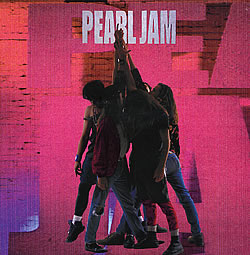Ten (Pearl Jam album) 1991
Ten is the debut studio album by the American rock band Pearl Jam, released on August 27, 1991 through Epic Records. Following the disbanding of bassist Jeff Ament and guitarist Stone Gossard’s previous group Mother Love Bone, the two recruited vocalist Eddie Vedder, guitarist Mike McCready, and drummer Dave Krusen to form Pearl Jam in 1990. Most of the songs began as instrumental jams, to which Vedder added lyrics about topics such as depression, homelessness, and abuse.
Ten was not an immediate success, but by late 1992 it had reached number two on the Billboard 200 chart. The album produced three hit singles: “Alive”, “Even Flow”, and “Jeremy”. While Pearl Jam was accused of jumping on the grunge bandwagon at the time—despite the fact that Ten had been both recorded and released before Nirvana’s Nevermind—Ten was instrumental in popularizing alternative rock in the mainstream. In February 2013, the album crossed the 10 million mark in sales, becoming the 22nd one to do so in the Nielsen SoundScan era and has been certified 13x platinum by the RIAA. It remains Pearl Jam’s most commercially successful album.
Guitarist Stone Gossard and bassist Jeff Ament had played together in the pioneering grunge band Green River. Following Green River’s dissolution in 1987, Ament and Gossard played together in Mother Love Bone during the late 1980s. Mother Love Bone’s career was cut short when vocalist Andrew Wood died of a drug overdose in 1990, shortly before the release of the group’s debut album, Apple. Devastated, it took months before Gossard and Ament agreed to play together again. Gossard spent his time afterwards writing material that was harder-edged than what he had been doing previously. After a few months, Gossard started practicing with fellow Seattle guitarist Mike McCready, whose band Shadow had broken up; McCready in turn encouraged Gossard to reconnect with Ament. The three then went into the studio for separate sessions with Soundgarden drummer Matt Cameron and former Shadow drummer Chris Friel to record some instrumental demos. Five of the songs recorded—”Dollar Short”, “Agytian Crave”, “Footsteps”, “Richard’s E”, and “E Ballad”—were compiled onto a tape called Stone Gossard Demos ’91 that was circulated in the hopes of finding a singer and drummer for the trio.
San Diego musician Eddie Vedder acquired a copy of the demo in September 1990, when it was given to him by former Red Hot Chili Peppers drummer Jack Irons. Vedder listened to the demo, went surfing, and wrote lyrics the next day for “Dollar Short”, “Agytian Crave”, and “Footsteps”. “Dollar Short” and “Agytian Crave” were later retitled “Alive” and “Once”, respectively. Gossard and Ament heard the demo with Vedder’s vocals and lyrics, and were impressed enough to fly Vedder out to Seattle for an audition. Meanwhile, Vedder had written lyrics for “E Ballad”, retitled “Black”. Vedder arrived on October 13, 1990 and rehearsed with the band (now joined by drummer Dave Krusen) for a week, writing eleven songs in the process. Vedder was soon hired as the band’s singer, and the group signed to Epic Records shortly thereafter.
The band, then named Mookie Blaylock, entered London Bridge Studios in Seattle, Washington in March 1991 with producer Rick Parashar to record its debut album. After working with Parashar on Temple Of The Dog, Stone and Jeff asked him to co-produce and engineer Ten. Parashar also contributed piano, Fender Rhodes, percussion, co-wrote vocal harmonies and co wrote the intro/outro of the album. A few tracks were previously recorded at London Bridge in January, but only “Alive” was carried over from that session. The album sessions were quick and lasted only a month, mainly due to the band having already written most of the material for the record. “Porch”, “Deep”, “Why Go”, and “Garden” were first recorded during the album sessions, everything else had been previously recorded during demo sessions at some point. McCready said that “Ten was mostly Stone and Jeff; me and Eddie were along for the ride at that time.” Ament stated, “We knew we were still a long way from being a real band at that point.”
The recording sessions for Ten were completed in May 1991. Krusen left the band once the sessions were completed, checking himself into rehabilitation. According to Krusen, he was suffering from personal problems at the time. Krusen said, “It was a great experience. I felt from the beginning of that band that it was something special,” and added, “They had to let me go. I couldn’t stop drinking, and it was causing problems. They gave me many chances, but I couldn’t get it together.” In June, the band joined Tim Palmer in England for mixing. Palmer decided to mix the album at Ridge Farm Studios in Dorking, a converted farm that according to Palmer was “about as far away from an L.A. or New York studio as you can get.” Palmer made a few additions to the already-recorded songs, including having McCready finish up the guitar solo on “Alive” and tweaking the intro to “Black”. Palmer overdubbed a pepper shaker and a fire extinguisher as percussion on “Oceans”.
In subsequent years, band members have expressed dissatisfaction with the way the album’s mixing turned out. In 2001, Ament said, “I’d love to remix Ten. Ed, for sure, would agree with me…It wouldn’t be like changing performances; just pull some of the reverb off it.” In 2002, Gossard said, “It was ‘over-rocked’, we were novices in the studio and spent too long recording, doing different takes, and killing the vibe and overdubbing tons of guitar. There’s a lot of reverb on the record.” In 2006, Vedder said, “I can listen to the early records [except] the first record…it’s just the sound of the record. It was kind of mixed in a way that was…it was kind of produced.”

